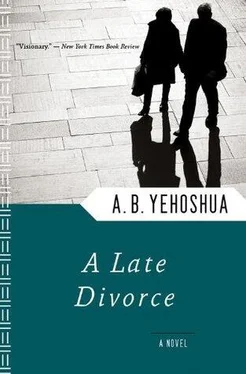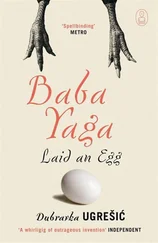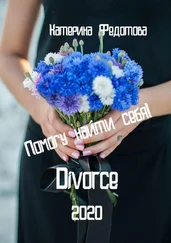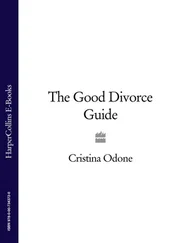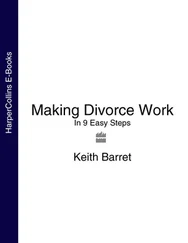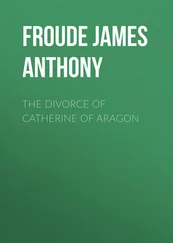“Are you here by yourself?” asked Rabbi Mashash. “Well, no matter. Dr. Ne’eman said he’d try to make it, but we won’t bother waiting for him.” Straightaway they began to rearrange the room, moving about chairs, putting the table in a corner, and seating Rabbi Avraham there by a window. The Yemenite scribe made room on it for his implements, paused to sniff some flowers before placing them on the floor, took out several bundles wrapped in large handkerchiefs from his plastic case, undid the knots, and produced an inkpot and some quills. Yehuda helped while the Russian remained by the door, his large blue eyes scanning the room suspiciously, his hands on the scarf still wound around his neck, as though uncertain whether to remove it. And then all at once he spoke, in a soft, melodic voice, with a terribly thick Russian accent.
“But where is she?”
“Where is who?” asked father.
“Your wife. The woman getting divorced.”
“My wife? She’s right here.”
“Her?” asked the Russian in amazement, pointing at me. He had been sure that I was a nurse and that the real wife would be dragged in any minute screaming and tied to a chair, drooling and letting her head loll. “This is her?” he asked again slowly, with disbelief.
“Of course,” put in Rabbi Mashash quickly, wiping away his perspiration, his cheeks ruddily blotched. “Of course it is. This is Mrs. Kaminka. Who did you think it was?”
He continued to wrestle with the flowers while, still on the threshold, Rabbi Subotnik threw me a sharp, annoyed glance as though he were the victim of a swindle. Yehuda helped the rabbis out of their coats. “Whew… it’s hot in here… a real spring day…” came their low voices while he bowed and scraped before them. When I went to pour the tea, though, he was suddenly in my way, pulling out my glass case from his pocket and murmuring, “Here, Ya’el had them fixed for you. Now you can read again.” He handed me a brown envelope from which he took a typed letter. “And this is the house waiver that you asked for. Everything is signed, exactly as you wished.” He ran a long finger down the printed lines, talking in a heated whisper. “Here.” He took out some more documents. “This is a power of attorney that I’ve given Asa. If there are any problems, he can act in my place.”
“Asa?” I marveled. “Why Asa? Why not Ya’el?”
“Because I didn’t want Kedmi butting in again,” he answered quickly. “Asa is the stablest of them all. The sanest.”
The papers made a rustling sound. I could actually smell his fear. How lucky that she isn’t here now, I thought, if she were she’d have a fit. “Why are you so pale?” I asked. He smiled bitterly. And then suddenly we felt how silent it was and saw the four of them watching us in wonder.
A Passover, a pastoral divorce, just a few hours before the seder, in the library of a rustic madhouse purposely garnished by me with flowers and greenery. The Yemenite finished arranging his quills and parchment and rolled himself a cigarette of greenish tobacco while gazing curiously out the window with his shrewd eyes, excited to be in an insane asylum. Rabbi Mashash handed out copies of our file, his jolly roundness filling the room, keen to get through with the ceremony in a hurry. “Professor Kaminka,” he called warmly to Yehuda, who winced at the words, making me wonder whether he had really been promoted in America or was simply trying to impress them. I passed among them pouring the tea while he followed me with spoons and sugar, offering them the crackers as though they were guests in our house. At first they balked, glancing at their watches to see if there was still time to eat leavened food, but in the end they each took a cracker, careful to keep the crumbs off their clothes. The Russian sat in a corner with his coat on, smelling unwashed; he had just taken hold of his teacup between two fingers in the ancient way, blown on it, and broken into a blessing in his slow, melodic voice when the door opened and a young woman I didn’t know, no doubt from the closed ward, came in with a book. I supposed she must have seen that the library door was open and hurried over to exchange it. At a loss, the men looked at me but I said nothing, not even when father rose to stop her. She slipped quickly past him into the room, and I knew at once that she had a double, that there wasn’t one of her but two, and that, though she knew she mustn’t come in, it was her double who had made her, who was now forcing her to simper and circle among us as tiny as a bird, studying the rows of books and touching them lightly while glancing at us over her shoulder. Suddenly she said in a violent whisper, “Get your hands off of me, you infantile jerk!” Everyone froze, except for the Yemenite, whose eyes sparkled with mirth. Yehuda made a move to restrain her but I put a hand on him because I knew that her double wouldn’t stand for it. Finally she took a book down from a shelf, glanced at it, threw it on the floor as though we weren’t there, and fled from the room with an obscene bump and grind.
The Yemenite was enraptured. Like a child he laughed merrily and even went to the window to watch her walk away. Rabbi Mashash, though, was annoyed. “This will never do. Perhaps we had better close the door, because we haven’t much time and we’ll never finish like this. I told Dr. Ne’eman that we needed a quiet place… well, never mind. Let’s begin. First, gentlemen, we will identify the divorcing couple.”
They opened their files for an identity check. First they asked for our fathers’ and mothers’ names, then for the names of their parents, and then for their dates and places of birth.
“Since everything is in order, Rabbi Korach,” declared Rabbi Mashash, “you can begin to write the divorce.”
But just then the young Russian — who had said nothing so far and had not even opened his file but had simply sat staring at me — rose from his place and said:
“One small moment. Not to rush, please. We must not go against law.”
And turning to Yehuda, he requested him to leave the room.
“But what is the matter?” Rabbi Mashash angrily protested. “What’s wrong?”
“I want to ask something the wife by herself,” said the Russian in his thickly accented, odd, melodious Hebrew. He took father by the arm and opened the door for him. “Please, one moment outside.” Something hard and domineering seemed to emanate from the gently bright-curled figure.
“But what’s wrong?” asked the other rabbis. “What is it you want? Why don’t you ask us first?”
He insisted, though, humming some biblical verse and repeating the name of some rabbinical authority. Yehuda grew alarmed. “All right,” he said. “All right. I’ll leave.” The door shut behind him while Rabbi Mashash and Rabbi Avraham jumped angrily up and glared at the troublemaker, moving back and forth in the room like the black hands of a clock, one big and one small, while he, a thin, light second hand, stood still and stared at me.
“I did not think that she… that you, madame… was in condition… that madame was so normal. I was said no choice in matter. But me, I see choice. In no circumstance… if mind is free… madame understands… she has right too, even in asylum… if madame says I do not sign… here is not Russia… here is no… nu …coercion…”
By now Rabbi Mashash was furious.
“Coercion? There’s been no coercion here, Rabbi Subotnik. What are you talking about? Mrs. Kaminka signed of her own free will. It was her decision. I beg of you. What are you trying to do? She herself asked him to come from America… you’re putting us in an impossible position… an impossible light… everything has already been seen to… we’ve given our word of honor… Rabbi Vital himself gave us his blessing…”
Читать дальше
